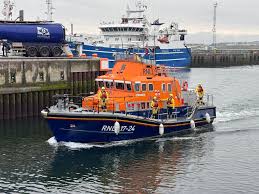The Lifesaving Work of the RNLI

Introduction
The Royal National Lifeboat Institution (RNLI) plays an essential role in maritime safety, providing a vital service to both local communities and tourists along the UK and Ireland’s coastlines. Established in 1824, the RNLI operates a network of lifeboat stations and lifeguards, responding to emergencies at sea and saving countless lives every year. With increasing numbers of people engaging in water-based activities, the relevance of the RNLI continues to grow.
Core Functions and Achievements
Recently, the RNLI has been in the spotlight due to their continued commitment to rescue efforts in the face of unprecedented challenges, such as the ongoing climate crisis and rising coastguard callouts. In 2022, the RNLI responded to over 8,000 emergencies, rescuing nearly 4,000 people from various maritime situations, including capsized vessels and swimmers caught in rip currents. These statistics highlight the importance of the organisation’s work and the dedication of its volunteers, who contribute over 100,000 hours annually to assure safety at sea.
The RNLI’s reach extends beyond rescue operations. The institution actively educates the public on water safety and prevention strategies. Their safety campaigns, such as ‘Respect the Water’, aim to inform beachgoers about potential risks and how to stay safe while enjoying water activities. In recent years, public engagement has surged due to increased awareness and community outreach.
Recent Developments and Future Challenges
In early 2023, the RNLI reported an increase in incidents involving personal watercraft, which has prompted a review of training programs and safety workshops. As recreational boating increases, especially following the pandemic, the RNLI is prioritising extensive training for lifeguards and volunteers to equip them for emerging challenges.
Additionally, the RNLI faces operational challenges, including funding and resource allocation. The cost of maintaining lifeboats and providing equipment is rising, requiring innovative fundraising strategies to sustain their services. The RNLI recently launched a new campaign encouraging donations through monthly subscriptions, which has already seen a positive response from the public.
Conclusion
The RNLI remains a cornerstone of safety and rescue at sea, adapting to modern challenges and striving to ensure the safety of all individuals enjoying water-related activities. With ongoing support from communities and individuals, the RNLI is expected to continue its life-saving efforts well into the future. Engaging with their safety advice and supporting their fundraising initiatives is crucial in ensuring the continued resilience of this vital service.









